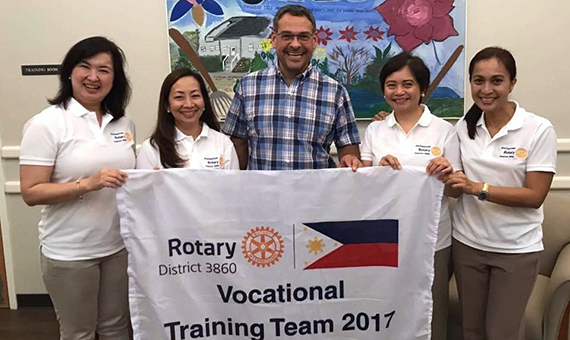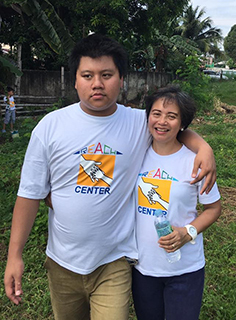
The vocational training team from District 3680. Sandra Espina second from right.
By Sandra L. Espina, vocational training team member, Philippines
Restless, finicky, speech delay … these are just some of the common adjectives used to describe people with autism. I am a mother of a 21-year-old boy who has autism. Zachary is a typical child with autism (CWA) who struggles to develop language skills and has restrictive, repetitive behavior. It has been a process of realization:
- My special boy has never rushed home from school to tell me a story of what silly thoughts transpired from the day or asked endless “why” questions.
- There are no loads of homework to manage at night nor report cards to gauge learning skills; unlike his two older siblings.
- Instead, he flaps, rocks back and forth, and smiles when he is happy.
In the course of this, we veered away from traditional education and focused more on what really matters to him – special school, therapy that suits his special needs, and activities that are purposeful and foremost to his well being.

Sandra Espina and her son
I have been a volunteer of a parents foundation that manages the Responsive Education for Autistic Children center. I have been a shoulder for parents to lean on and have witnessed how these special kids struggle each day to lessen their deficits in social communication and behavior.
During the 1970’s, the Treatment and Education of Autistic and Communication Handicapped Children (TEACCH) researched program was formed at the University of North Carolina. In August of 2017, I had the opportunity to be a part of the TEACCH training program through a vocational training team sponsored by Rotary District 3860 (Cebu, Philippines) and District 7600 (Virginia, USA). In addition to myself, the team included another mother of a child with autism who is a medical specialist and our Rotarian team leader.
The TEACCH Method has helped children at our center and their families learn how to become functional in life and experience progress in their daily activities. It promotes meaningful engagement in activities, flexibility, independence and self-efficacy. And it helps children with autism have a better understanding of their surroundings.
This vocational training experience has helped me as a mother, a volunteer, and as a program director at the center to apply what I have learned from TEACCH in our center and to thousands of public school teachers, therapists, parents, and government health workers in our city.
I am forever grateful for Rotary and their efforts to help those with autism.
https://blog.rotary.org/2019/09/26/vocational-training-team-helps-with-autism/
